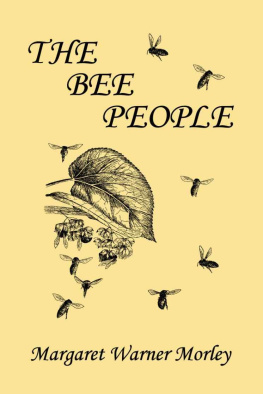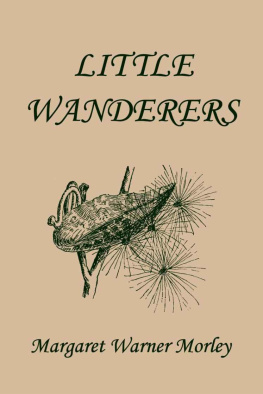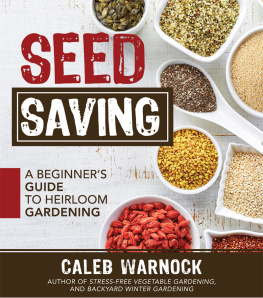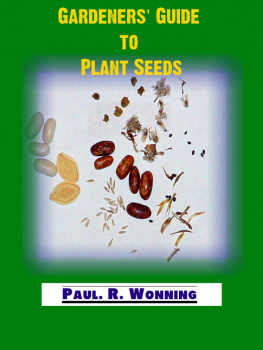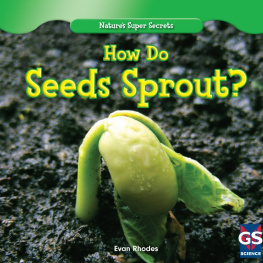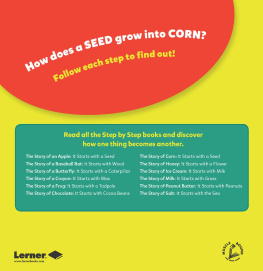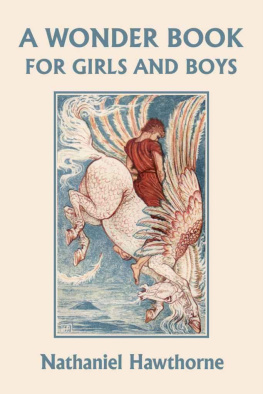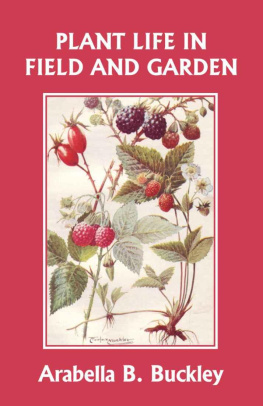Seed-Babies
by
Margaret Warner Morley
Yesterday's Classics
Chapel Hill, North Carolina
Cover and Arrangement 2010 Yesterday's Classics, LLC
All rights reserved. No part of this book may be reproduced or retransmitted in any form or by any means without the written permission of the publisher.
This edition, first published in 2010 by Yesterday's Classics, an imprint of Yesterday's Classics, LLC, is an unabridged republication of the work originally published by Ginn & Company in 1896. This title is available in a print edition (ISBN 978-1-59915-316-2).
Yesterday's Classics, LLC
PO Box 3418
Chapel Hill, NC 27515
Yesterday's Classics
Yesterday's Classics republishes classic books for children from the golden age of children's literature, the era from 1880 to 1920. Many of our titles are offered in high-quality paperback editions, with text cast in modern easy-to-read type for today's readers. The illustrations from the original volumes are included except in those few cases where the quality of the original images is too low to make their reproduction feasible. Unless specified otherwise, color illustrations in the original volumes are rendered in black and white in our print editions.
Contents
Beans
I.
"W ELL, I never!"
Jack said that because all the beans he had planted were on top of the ground.
Jack was only six years old, and not very well acquainted with beans.
No wonder he was surprised to find them on top of the ground when he had tucked them so snugly out of sight in the brown earth only a few days before.
Jack looked at his beans and began to get red in the face.
He looked a little as if he were going to cry.
"When Ko comes I'll just punch him!" he said at last.
For who could have uncovered his beans but his brother Ko?
For Ko would rather tease than eat his dinner,except when there was chocolate pudding for dessert.
Ko's real name was Nicholas, but it took too long to say that, so Jack called him Ko for short.
Jack picked up a bean to replant it, and what do you think had happened? Something had, for it did not look as it did when he first put it in the ground.
It had turned green to begin with. Jack had planted white beans.
He knew they were white all through, for he had bitten a good many in two to see how they looked inside. And now the coat on the outside, that stuck so tightly at first, had peeled half off, and the bean was green!
Something more had happened,a little white stem had come out of the bean and gone into the ground.
Jack was so surprised at all this that he forgot he was angry at Ko, and when his brother came up only told him to look.
Ko tried to pick up a bean too, but it was fastened quite firmly in the ground.
"They're growing," said Ko.
"Did you pull them up?" asked Jack.
"No, indeed!" said Ko.
"They must have pulled themselves up," said Jack.
"Yes," said Ko, "that's it. They grew so fast they pulled themselves right up."
Then Jack sprinkled earth over them until he could not see them, and went away.
In two or three days they were all on top of the ground again!
"Well, well, well!" said Jack, "they don't know anythingto keep unplanting themselves that way!"
But now he could not pick up any of the beans without tearing loose the stout little stem with roots at the end, that had gone down into the ground.
"You bean," he said, tapping one on its green head,for they had grown very green now,"you bean, I shall plant you deep enough this time; you will die and not grow at all if you don't stay still in the ground."
At this the bean smiled.
A bean cannot smile, you say? Oh well, that is what nearly everybody would say, but I can tell you, a great many people do not know about beans, and I am sure that bean smiled.
"If I did stay still in the ground, how could I grow?" asked the bean.
You think beans cannot talk?
Well, as I said before, a great many people do not know about beans; and whether they can talk or not, this bean asked Jack how it could grow if it stayed still in the ground. And what is more, Jack was "stumped," as the boys say, by the question, and could not answer.
Of course nothing that stayed perfectly still could grow.
"But why don't you send up a little stem and let the bean that I planted stay planted?" asked Jack.
"I will tell you," said the bean; and if by this time you do not believe beans can talk, you may as well not read another word of this story.
Talking beans are just as true as "Cinderella," or "Hop-o-my-thumb," or "Little Red Riding-Hood," or "Jack the Giant Killer," and those people.
Of course everybody knows how true they are.
So Jack's bean said, "I will tell you," and then asked, "Are your hands clean?"
"They're fair to middling," said Jack, looking at his hands, and for the first time in his life wishing he had washed them.
"Oh well," said the bean, "if they are not sticky it won't matter. I am going to let you look at me, but I don't want you to pull me apart, either on purpose or by accident."
"I won't," said Jack.
"Well, then, very gently open this green part that you planted when it was white, and that won't stay under the ground, and look."
Jack did so.
He found the green part was split in two halves, and right between the halves, fastened at the end where the root went down, were stowed away two pretty green leaves.
"My!" said Jack.
"Well, I guess so!" said the bean, rather proudly. "You see I have these little leaves packed away even when I am white.
"But then they are also white and very, very small.
"You very likely would not even see them, at least not with your own eyes.
"You would see something if you knew where to look, but you would not see two leaves without the help of a magnifying glass.
"But I know they are there all the time."
II
"T ELL me more," said Jack. He thought it the jolliest thing in the world, as it certainly was, to have the beans talk to him.
The bean was as pleased as he was, for it liked to talk, and it could not always find so good a listener.
So it said, "I keep my two white little leaves very closely packed away between my two big hard white cotyledons."
"Your two big hard white what?" asked Jack.
"Cotyledons."
"My!" said Jack.


